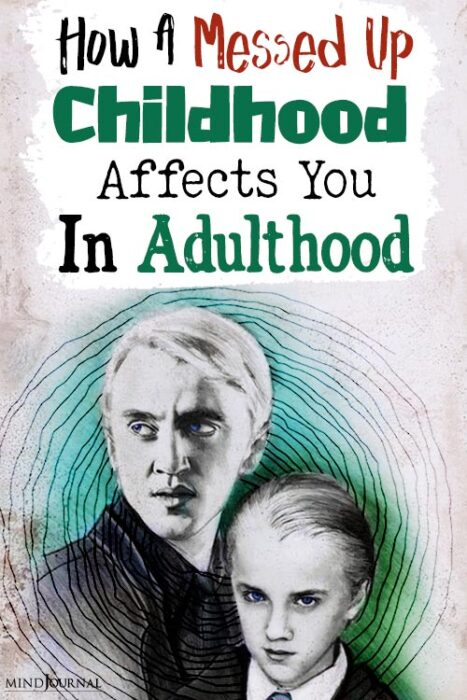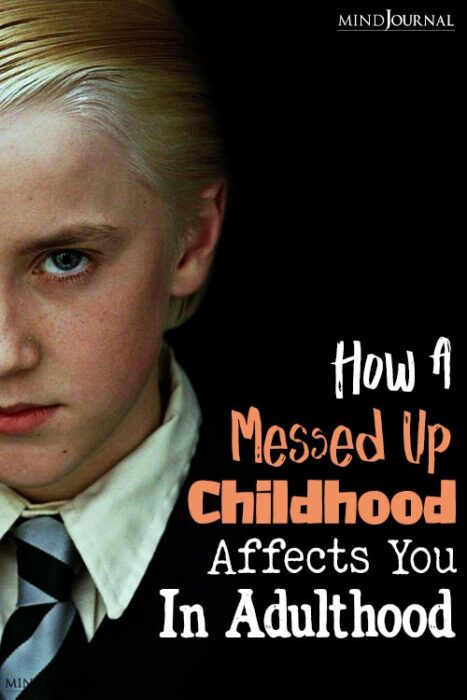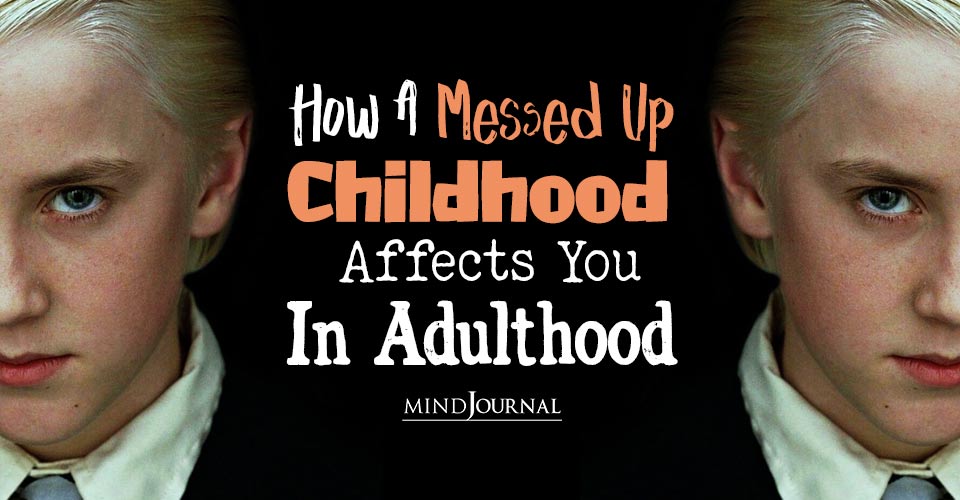Childhood. The best time of our life. While most people will agree with this statement, some of us may coil in fear the moment our repressed childhood memories start to emerge from their dark trench.
Not every childhood is happy. Some are painted with the darkest shades of abuse and trauma which can keep us trapped in the blackened closet of fear even in our adulthood.
Childhood is the golden age – a time of joy, innocence, wonder, exploration, optimism, and unconditional love.
A time when we are protected and cared for by our parents and family – and all these experiences build the foundation that allows us to grow up as secure, healthy, and responsible adults.
But what happens when your childhood is messed up? What happens when a child is neglected or overprotected, abused, and abandoned?
Read The Long-Term Effects of Childhood Trauma In Adulthood
Abuse is a fertile ground for sprouting trauma and these adverse childhood experiences can completely ravage our adult lives – from our relationships and career to our mental and physical health.
Studies show that about 43% of children experience at least one trauma, while 15% of girls and 6% of boys develop post-traumatic stress disorder or PTSD.
Developmental trauma can make us feel disconnected as adults and cause shame, guilt, and multiple psychological issues.
Do your childhood memories keep you awake at night? Here’s how a chaotic and messed up childhood can affect your adult life.
11 Ways Childhood Trauma Affects Us In Adulthood
1. You may develop mental health disorders
Researchers have observed childhood abuse, neglect, and maltreatment can lead to anxiety disorders, depression, post-traumatic stress disorder, aggressive behavior, and suicidality in adults.
When you have been regularly neglected or abused as a child, you become vulnerable to developing issues with cognition, memory, verbal communication, and concentration. You may also experience chronic stress and panic attacks.
Read 14 Signs A Child Is Struggling With Their Mental Health
2. You may develop attachment issues
Psychoanalyst John Bowlby and psychologist Mary Ainsworth developed the attachment theory to focus on how our thoughts develop as a child based on how our parents treated us.
Sadly, it was found that children who experience abuse and trauma tend to develop insecure attachment styles which can negatively affect their adult relationships.
So as an adult, we may have difficulty forming healthy attachments with our loved ones. Known as reactive attachment disorder or RAD, it can affect our mood, behavior, and our ability to trust others and build close relationships.
3. You may attract toxic relationships
Our relationship and attachment with our parents or primary caregivers greatly contribute to the development of our belief system. The relationship we share with our parents tells us what relationships should look and feel like.
So when we have toxic and abusive parents, we naturally seek toxic and abusive partners as adults.
While we may repress all our childhood memories, subconsciously, we get romantically attracted to individuals with toxic traits… just like our parents – abusive and emotionally unavailable.
Toxic partners fit our trauma identity and abusive relationships feel familiar to us, even when we know that such relationships are not healthy for us.
4. You may give in to addictions
People who have been abused as a child have difficulty managing stress and conflict. When we don’t seek help for our issues, we try to self-medicate with substances, alcohol, or even food.
As we desperately try to cope with our past trauma and underlying internal conflicts, we may become addicted and develop substance use disorder.
Meet Becky – a happy and cheerful little girl who was always criticized by her dad. No matter what she did or achieved as a child, she could never make her dad happy, when all she wanted was for her father to be proud of her.
As Becky grew up in this dysfunctional, toxic family, it became hard for her to cope with her internal conflicts and difficult emotions. Sadly, she found solace in sugary treats and scrumptious desserts. While these made her feel good, safe and comfortable, soon she became addicted to sugar. It was only after her physical health started to get affected due to her sugar addiction, Becky realized what sort of poison she was consuming.
5. You may have low self-esteem
If you were ignored, neglected or abused as a child, and no one came to comfort you when you cried for help, then it is likely that you have feelings of low self-worth.
Your messed up childhood has negatively impacted your self-esteem and now you have a poor sense of self.
Even as an adult, you are afraid of getting rejected by others and being abandoned by loved ones, which is why you may avoid closeness in relationships or may become needy.
6. You may develop eating disorders
Children who have been emotionally or physically abused are highly likely to develop eating disorders like Anorexia Nervosa, Bulimia Nervosa, and Binge Eating Disorder (BED).
Developing unhealthy eating habits can make you feel like you have some control over your body when your whole life feels out of control. But in the long run, you may start struggling with weight issues – whether it’s being underweight or being obese.
7. You may suffer from chronic illness
Developmental trauma can seep into your body as you grow up and cause severe physical health issues.
Studies show that past trauma can increase the level of norepinephrine and cortisone in our body and can increase the risk of heart disease, diabetes, specific cancers, autoimmune disorders, and obesity in the long run.
8. You may become a perfectionist
A messed up childhood can make us believe that we are flawed and so as adults, we become perfectionists. But what’s wrong with being perfect? Right?
Well, what good is perfectionism if it makes you feel anxious and sad, lowers your sense of self-worth, and holds you back from being happy.
People with traumatic childhoods often have unrealistic high standards and pursue self-critical perfectionism, whether taught by their parents or due to their own lack of self-esteem. Studies have found that perfectionism can cause anxiety disorders, depression, eating disorders, and increased suicidality.
When you seek perfection due to your abusive childhood, it can rob you of happiness, creativity, inspiration, and productivity and instill fear in your heart.
9. You may avoid relationships
Thanks to insecure attachment style and fear of rejection, people with a messed childhood lack the desire and skills to build close relationships.
Negative developmental experiences in childhood make us believe that we are damaged and so no one can love us. We believe we are incapable of healthy communication and relationships, resulting in self-condemnation and feelings of being not good enough.
So we unconsciously or subconsciously push others away by acting as a threat even though that’s not who we are.
Take Steve for instance. Steve was a bright young boy who got good grades in school and his friends loved hanging out with him. But having a narcissistic mother meant Steve was emotionally abused, neglected, and criticized almost on a daily basis, while his brother was loved and praised every time. He grew up believing he was not good enough.
As an adult, Steve became introverted and mostly kept to himself. While he was a smart, handsome young man, he hesitated to date others, even though a lot of women were interested in him. He believed he was not good enough for anyone and even if he managed to get a girlfriend, they would surely leave him once they got to know him. Thankfully, Steve got the help he needed once he started going for therapy.
10. You may isolate yourself
Do you believe you are better off alone? Researchers have observed that individuals with a history of abuse in childhood tend to have social anxiety and fear which makes them socially withdrawn in their adulthood.
As we avoid closeness with others, we become loners and isolate ourselves. We believe we prefer solitude even though deep down we want to be loved, cared for, accepted, and appreciated.
11. You may avoid self-care
When you struggle internally to cope with the memories of an abusive childhood, your ability to care for yourself becomes impaired.
While self-criticism comes easily, adults with a traumatic past struggle with self-love, self-empathy, and self-compassion. Our childhood trauma makes it difficult for us to accept our own selves.
Can you identify any of these signs in yourself?
Acknowledging that you are a victim of childhood abuse and accepting yourself with all your flaws is the first step to overcoming your past trauma.
Seeking help and therapy from a mental health professional can help you develop healthy coping skills and build a happier future for yourself.
How else do traumatic memories of a messed up childhood affect our adult lives? Do let us know in the comments.










Leave a Reply
You must be logged in to post a comment.